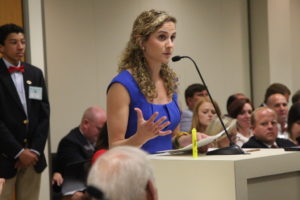The daughter of a doctor and a nurse, Pennsylvania native Katherine Restrepo always felt connected to the health care field. But a disinterest in hard sciences led her to pursue other academic passions at McDaniel College. She pulled double duty in two fields – as a political science and Spanish major and an athlete on the school’s basketball and track and field teams.
Unsure of exactly what career path she might follow, a senior year capstone project on the debate over health care as a universal human right sparked her interest in health care policy. Shortly after, a family friend suggested that she apply for an internship at the Cato Institute, a prominent free-market think tank in Washington, D.C.

“I blindly applied and didn’t even know what a think tank was at that point,” Restrepo said. “Even though I was a political science major I didn’t know that Cato and Heritage were organizations that existed…I was reading about a lot of stuff that wasn’t free-market in my college curriculum.”
A path to finding a passion
Restrepo was accepted to the institute’s prestigious internship program after graduating from McDaniel in 2012. She was paired with leading health care policy analyst Michael Cannon, director of Cato’s health policy studies. During her time at Cato, health care policy consistently made headlines as a hot topic as the country was embroiled in debates over subsidy lawsuits concerning the 2010 Affordable Care Act (ACA).
Restrepo’s main responsibility at Cato was the wearisome task of researching congressional history prior to the ACA’s passage to find any evidence of whether subsidies were in fact limited to state exchanges only. She describes the effort as necessarily tedious, but knowing the hard work would enable her to excel.
Her four months working for Cannon solidified her interest in the policy, administrative, and legal aspects of health care and led to a permanent position. In 2013, she joined the John Locke Foundation, a Raleigh, North Carolina state-focused policy organization, as a health and human services policy analyst. She quickly made her stamp and is now a regular contributor to Forbes’ blog.
Helping interpret health care policy for better consumption
At the Locke Foundation, Restrepo breaks down the complexities of health care so that lawmakers, policy shapers, and interested readers are better informed about the state and federal policies that affect us all. She does this by researching, writing, and appearing as a panelist at conferences and events. Over the past three years, she’s covered everything from the ACA to Certificate of Need laws in the state. While her job requires plenty of solo work, she’s found she must go beyond the computer screen.
“You have to get the inside story from people all around [you], even people you disagree with…to help you have the proper understanding of the issue,” she said.
Bringing the message to Millenials
Through her policy research, she’s become particularly passionate about showing health care’s relevance to her fellow Millennials. One such innovation (and one of Restrepo’s favorite areas of research) is the Direct Primary Care model (DPC), an arrangement where primary care doctors and patients forgo insurance in lieu of a flat monthly fee.
“[DPC] can deliver health care services at an affordable price to the masses based on a monthly membership fee that’s just like a gym membership,” she explains. “You can call, email, Skype, telemedicine with your DPC doctor at all hours of the day, and that just enhances that monthly payment that you pay to have your doctor on retainer.”
Restrepo believes that Millennials’ notorious desire to utilize “on-demand” services and technology will drive Direct Primary Care to the health care mainstream in the near future, and she is excited to see how the largest-generation’s wallet power will affect policy changes as providers adapt to Millennials’ consumer preferences. [See: “Could Millenials Make Direct Primary Care Mainstream Medicine?“]
Describing the way she views her career trajectory and her goals, she graciously attributes her philosophy to family.
“My family taught me to enjoy my successes but prepare for the rest,” she said.
Currently, that preparation includes obtaining her Masters of Health Care Administration at the UNC Gillings School of Global Public Health, a program she completed in summer 2016. Between classes and work, she enjoys running, golfing, and spending time with her kitten, Cato, affectionately named for the organization that helped her grow into a staunch proponent of individual freedom. With the drive to change the health care game for the better, Katherine Restrepo is a part of the rising group of health care thought leaders.